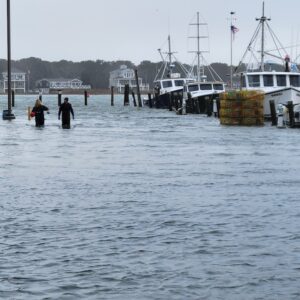Who is a member?
Our members are the local governments of Massachusetts and their elected and appointed leadership.

Flooding as a result of coastal storms is just one of the climate-related concerns facing Westport. (Photo courtesy town of Westport/Chris Leonard, former harbormaster)
With coastal storms growing stronger, sea levels rising, and extreme heat events increasing, the town of Westport has joined forces with the University of Massachusetts Dartmouth to develop a long-range climate resilience action plan that will help guide decision making for the coastal community and provide practical support for residents.
The town’s volunteer Climate Resiliency Committee, formed in 2022 as a result of a Municipal Vulnerability Preparedness grant, has been working on developing the framework for the plan, but decided it would be ideal to bring in subject-matter experts to help synthesize all the ideas and build out a strong report.
“The work of the committee is really driven by a strong volunteer base,” Town Planner Michael Burris said. “That’s something that we’re very lucky to have here.”
Burris, who provides support to the committee, said that the partnership between the town and UMass Dartmouth is a result of networking, born out of preexisting connections between John Bullard, chair of the committee and a former mayor of New Bedford, and the university. Burris said the university also feels like a good fit because of the work it is doing with blue economy initiatives. Last year, UMass Dartmouth secured $8 million in state funding to support the university’s regional work on sustainability and blue economy innovation.
“We’ll now have access to cutting-edge tools that can model and visualize climate impacts specific to Westport,” John Bullard said in a statement. “These will help us communicate risks more effectively to town officials and residents. UMass Dartmouth will also support us in creating a framework to prioritize the most impactful actions, informed by successful strategies from similar communities.”
Westport, a low-lying town bordering Rhode Island with a couple different barrier beaches and the tidal Westport River, has a number of areas of concern when it comes to resiliency, Burris said. It experiences flooding from sea-level rise and coastal storms, which damage municipal roads, and major wind events damage electric infrastructure.
The town has significant tree cover, Burris noted, and all power lines are overhead. Tree damage from major storms causes power losses, which is of particular concern because the majority of the town needs electricity to power water supply wells and wastewater pumps.
The town also has an aging population that is particularly vulnerable to extreme heat events.
“There’s a fair amount of the housing stock that was created prior to air conditioning being common,” Burris said. “A lot of those homes are also concentrated in the north end of Westport, and that’s also a place where Westport’s environmental justice population is located.”
As the partnership gets underway, Burris said he expects that the final climate resilience action plan will be developed within the next two years, alongside other committee resiliency projects. The town has also applied for a Municipal Vulnerability Preparedness grant to support public engagement efforts to bolster the plan.
Like many towns across the Commonwealth, Westport has limited staff capacity, and the interest and dedication of volunteers has been vital, Burris said. For other municipalities looking to increase volunteer involvement on committees, Burris said identifying community champions who consistently come out to public meetings is an important starting point.
“They’re always wanting to get involved and seeing where, you know, maybe climate resilience isn’t necessarily a direct call to action for them, but maybe agriculture is,” Burris said. “Climate change will have an impact on agriculture, and so maybe that’s the way to bring them into the fold.
“Trying to find those community volunteers, I think, is really critical.”